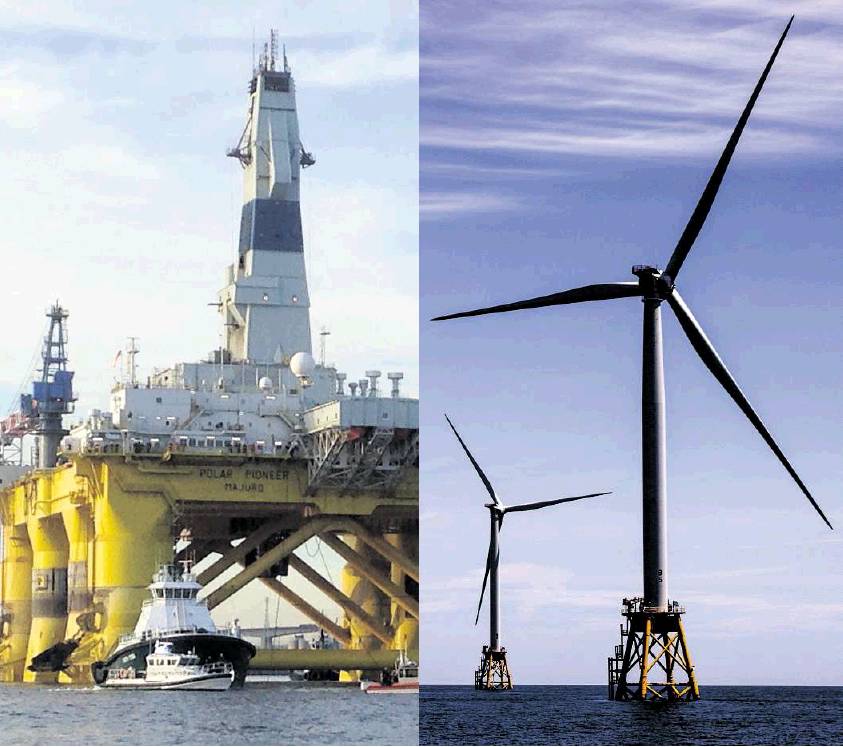ENERGY
Changes predicted in face of climate risks
Search for cleaner energy could cut budgets for oil, gas exploration
By Jordan Blum STAFF WRITER
The growing risk of climate change and the move toward cleaner energy sources are threatening to slow spending on traditional oil and gas exploration worldwide, a new report says.
The largest energy companies are cutting exploration budgets and facing shareholder pressure to conduct less exploratory drilling as the world’s oil and gas reserves grow and crude prices stagnate, according to energy research firm Wood Mackenzie.
“Some investors are questioning the need to explore at all given the vast discovered resource base yet to be developed,” said Alana Tischuk, of Wood Mackenzie’s global exploration team. “The move from Big Oil to Big Energy is under way, but building materiality will take time.”
While energy giants explore less, exploration won’t end anytime soon.
“Companies will drill in the hope of finding better resources than those they already have — lower-cost barrels with a higher margin,” Tischuk added.
Future exploration will focus on valuable prospects in new and emerging plays around the globe — and less in the United States, the report said. Energy majors such as Exxon Mobil and Chevron are likely to remain in high-impact exploration plays, but national oil companies in the Middle East, China and other regions, which don’t face investor concerns, may also step up exploration.
And despite low natural gas prices worldwide, many companies believe probing for cleaner-burning gas is critical to the transition to renewable energy.
Likewise, more money will be invested in efforts to develop offshore wind power capacity, according to the Norway-based energy research firm Rystad Energy. Its study found that U.S. offshore wind capacity could reach 20 gigawatts by 2030, potentially generating annual investments of $15 billion. Meanwhile, yearly spending on U.S. offshore oil and gas projects is expected to average $14.8 billion through 2025, Rystad’s study found.
Wood Mackenzie predicts that global oil and gas exploration spending could be double that amount, up to $30 billion, which is about the same as last year. That money would help complete 500 to 600 exploratory wells this year, the research firm said. That would add about 15 billion barrels of oil equivalent, in line with industry performance since the last oil bust began in late 2014. But exploration budgets could decline by as much as 15 percent, as companies aim to be more efficient.
Much of the oil and gas exploration will remain in Latin America and South America, from Mexico to Guyana, where Exxon Mobil started producing oil in December, as well as in sub-Saharan Africa. French energy major Total has high hopes for South Africa after making the giant Brulpadda gas discovery in 2019. Total also will drill its giant Venus oil prospect off the coast of Namibia. Royal Dutch Shell and Dallas-based Kosmos Energy also are hunting oil off the coast of Namibia.
“Drilling in Guyana will continue both in the prolific Stabroek block and beyond it,” Tischuk said. “In Suriname, where (Houston-based) Apache Corp. made the giant Maka Central discovery at the end of last year, we expect wells on four blocks in 2020.”
Apache recently formed a joint venture with Total for its offshore Suriname exploration.
With added exploration, more companies are quickly leaving low-risk acreage if they don’t have immediate success, Tischuk said.
“Traditionally, majors have held their acreage to the end of term, but we expect them to adopt the swift turnaround approach of their smaller, nimbler cousins,” she added. “Many of the areas the majors have added are ultra-frontier, giant blocks, added for minimal commitments. This trend of fast turnover of new acreage may not become apparent in 2020, but instead materialize in the next three years or so.”
And more national oil companies are expected to extend their exploration range worldwide. Qatar Petroleum has sought to go international, and more Chinese firms are exploring in Latin America and Africa.
Also, fewer companies will handle the exploration load. The corporate landscape has fallen by almost 50 percent since 2013. Many of the companies being squeezed out are small independents and private equity-backed companies that lack the cash or the risk appetite to stay in the longer-term exploration game.
L.M. Sixel contributed to this report jordan.blum@chron.com
